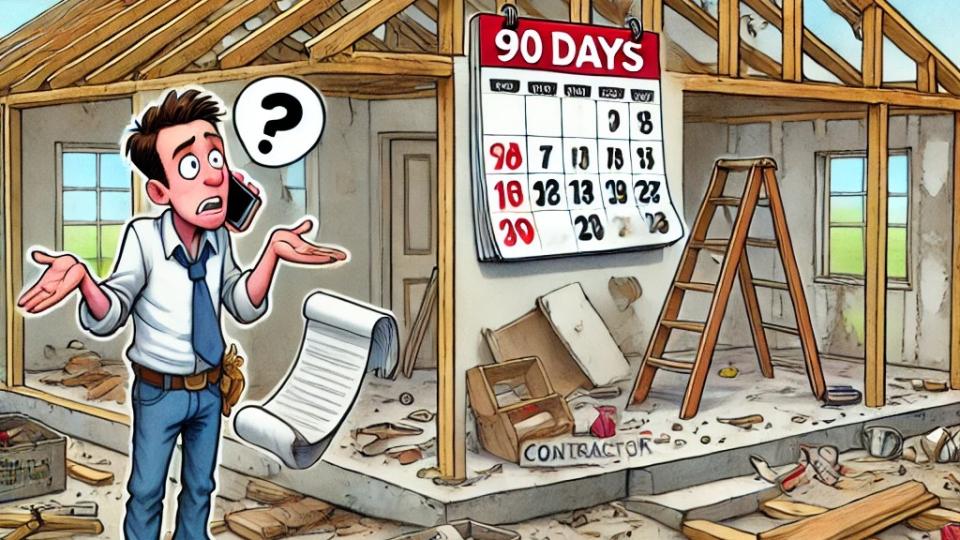If you've ever hired a contractor for a home improvement project, you probably assumed they would finish the job as promised. But what happens when the work slows to a crawl—or worse, stops altogether?
Georgia attorney and contract specialist Kevin Veler recently sat down with consumer investigator Dale Cardwell to discuss the legal complexities of contractor abandonment. Their conversation shed light on what homeowners can do to protect their investment, enforce contracts, and move forward when a project goes off the rails.
What Constitutes Contractor Abandonment?
Unfortunately, Georgia law does not provide a straightforward definition of “job abandonment.” However, the state's Contractor Licensing Act does specify that if a state-licensed contractor leaves a job unfinished for 90 days without action, it can be considered abandoned.
That said, waiting three months for a contractor to return is not realistic for most homeowners. The good news? Your contract should outline expected timelines, and you have legal options much sooner than 90 days.
Key Takeaway: If your contractor is stalling, check your contract for specific deadlines and clauses regarding abandonment or delays.
The Importance of a Well-Written Contract
One of the biggest mistakes homeowners make is not having a detailed, written contract. A strong contract should include:
- A clear project timeline with a start and expected completion date
- Payment terms tied to specific milestones
- A default and cure clause, which outlines what happens if the contractor fails to perform
- Any penalties for delays, especially for major projects
Many contractors resist firm deadlines, but including them in your contract can save you significant frustration down the road.
Pro Tip: Take photos, record conversations, and keep a daily log of work progress. If your contractor claims they’ve been working but have only shown up for a conversation, you’ll have proof to dispute their claim.
What Are Your Legal Options?
If your contractor is dragging their feet, you’re probably wondering if you can simply hire someone else and refuse to pay. The answer depends on your contract and the steps you've taken to resolve the issue.
Here’s what you can do:
- Send a formal notice – Before taking legal action, Georgia law requires you to provide written notice of the issue and give the contractor an opportunity to fix it (this is known as the “right to cure”).
- Consider small claims court – If the dispute is for $15,000 or less, you can represent yourself in Georgia’s Magistrate Court.
- File a claim for damages – If the contractor has taken a significant amount of money and not performed, you may be able to sue for breach of contract.
- Look into lien law protections – If a contractor threatens a lien, don’t panic. A lien is not an immediate right to take your home. You can file a Notice of Contest (Georgia Code OCGA 44-14-368) to force them to act within 60 days or forfeit the lien.
Can You Include Penalties for Delays?
Yes—although most residential contractors resist them, penalty clauses are standard in commercial contracts. If you can negotiate one, it can serve as a deterrent against unnecessary delays.
Additionally, manufacturers’ installation guidelines can help determine whether work was done correctly. If a contractor has installed something improperly, the Right to Repair Act gives them 30 days to correct it before you can bring in another contractor.
When to Walk Away
If you’ve spent 70-80% of your budget and the work is still incomplete, hiring a completion contractor may be your best bet. While the original contractor may not come after you for the final balance, be prepared for additional costs.
Ask Yourself:
- Have I given the original contractor a fair chance to fix the issue?
- Do I have enough documentation to defend myself if they demand final payment?
- Is pursuing legal action worth the cost and effort?
Final Thoughts
Dealing with an unresponsive contractor is frustrating, but Georgia law does provide homeowners with legal protections. The best way to avoid these issues? A detailed contract, clear communication, and thorough documentation.
If you're facing contractor problems, consulting a contracts attorney like Kevin M. Veler can help clarify your options. And for vetted, reliable home service professionals, check out TrustDALE’s Certified Partners—so you never have to deal with abandonment in the first place.


